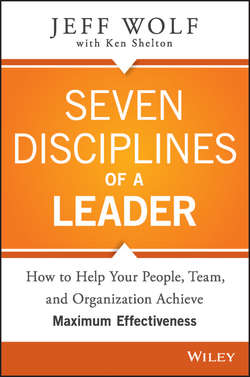Читать книгу Seven Disciplines of A Leader - Wolf Jeff - Страница 7
На сайте Литреса книга снята с продажи.
Introduction
What Makes Certain Leaders Highly Effective?
This Book Is Designed to Boost Your Leadership Effectiveness
ОглавлениеI intend your experience to be, as my colleague Susan Spale wrote:
● Thought provoking! It will cause you to think about your role in new ways.
● Challenging! It will stretch you to achieve higher performance.
● Meaningful! It is relevant to enhance your value on the team.
● Interactive! It challenges you to own your learning process.
● Rewarding! You feel that it's a great investment of your time.
● Inspiring! It moves you to take action.
● Practical! It provides easy transfer to your work.
This book will also deliver four major benefits: (1) Build and sharpen your core leadership skills; (2) Enhance your market position and reputation by attracting and retaining the best talent, leading to healthy revenue growth; (3) Improve your decision making, interpersonal relations, and teamwork; and (4) Assist you in becoming a highly effective and dynamic leader, leading to increased employee engagement, enhanced customer service, and a strong bottom line.
In my work, I address leadership development as a means of improving performance and productivity, empowerment and engagement, retention and succession, and making a long-term impact on teams and organizations.
Astute leaders today turn to coaches as catalysts to accelerate change and achieve desired results. Why? Because there is just so much time in the day, and leaders and their staffs are so overburdened there's rarely enough time to step back and examine the big picture.
The best executive coaching delivers dramatic results, expressly because its practitioners realize that coaching is not about them. They understand that people have the answers and solutions they need to make a positive behavioral change. They simply provide the discipline and resources for them to identify and implement their own solutions. They are both coach and catalyst for change, helping clients focus on specific goals and providing them with the tools, knowledge, and opportunities they need.
I feel that most management education and leadership development fails top leaders because the discipline and resources are missing. I've seen it, and it is tragic: throwing younger supervisors of the company into the fray without them having any understanding of what it takes to lead and motivate their people, allowing them to make profound mistakes, and then relieving them of their responsibilities when they don't perform. The result: damaged careers and a loss of potential leaders for the company. Doesn't make sense.
During the last recession, which has been a new experience for many leaders, the focus has been on survival, with little attention on growing leaders or providing current leaders with the skillsets to lead in an uncertain economic environment.
When there were leadership development efforts, they were usually for the mid-level and senior level, provided mostly through training classes consisting of full-day or week-long sessions, but lacking a coaching component to reinforce the skills learned in these classes. Why is coaching so important? Because personal coaching not only changes the behavior of participants, but aids them in real-time on-the-job situations.
Additionally, organizations need to look at developing high-potential individuals and frontline leaders of managers and supervisors to provide them with the skillsets needed to hone their craft. This element has been absent for years, and now that the economy seems to be getting on track, hopefully this all-important group will be developed.
This demerit needs to be offset by a different mindset, skillset, and style. Leadership effectiveness is the result of a regimen of Seven Disciplines that culminate in the realization of a compelling vision of service to others, using the tools at your disposal, with a clear vision of what you want to accomplish with the resources at hand. Effective leaders create a synergy of interdependent functions to make the business run as a singular, unique, integrated, and open system. Nearly all executive decisions for solving any single problem cut across the organization, with consequences for multiple divisions. Hence, we see many examples of well intended decisions with unintended consequences that undermine profitability and sustainability.
The real test of leadership effectiveness happens during turbulent economic times and when changing strategic direction. You know that it's time for change when routine activities are not delivering the intended results. Since Dr. W. Edwards Deming, a celebrated statistician, engineer, and management consultant, proved that 94 percent of all results are systemic in nature, any successful leader must demonstrate effectiveness at leading and managing the entire value chain or entire system. Ultimate responsibility over the entire value chain is what sets the leader's position apart from other executive roles.
The responsibility for the value chain carries through to all levels of the company, including that of the first-line supervisor, the leader who is responsible for executing orders that originated at the top. As costs out of his control escalate (such as the price of purchased material and the hourly labor rate in a manufacturing operation), he has the burden of finding enough cost reductions to offset the increases. Oftentimes, the P&L of the company rests on his shoulders.
Leaders need not always learn by hard or bad experience or be left to their own devices. My development system, which I describe in this book, provides leaders with disciplines that help them organize and execute to get desired results.
